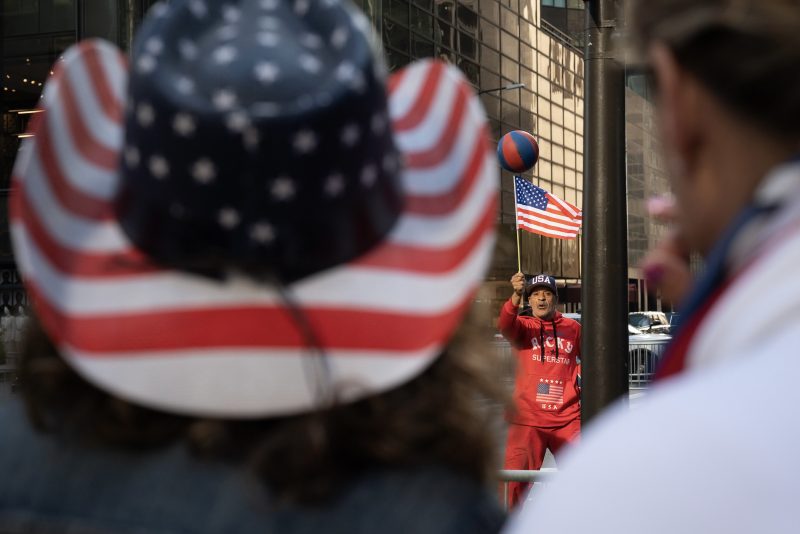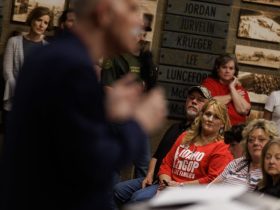NEW YORK — It started before dawn on Tuesday. Police officers stood at every corner outside New York County Criminal Court. Satellite trucks glimmered in the darkness. Across the street, about 150 journalists, professional line-sitters and others summoned by the Task Rabbit app queued up in the quiet, waiting overnight for tickets to gain access to yet another line, to eventually, maybe, get inside the courtroom that afternoon. Pizza boxes and coffee cups lay abandoned at their feet.
As the morning sun crept over the courthouse, protesters and counterprotesters and the political voyeurs of New York left home and descended on the same one-block radius in Lower Manhattan, all of them here to mark the arraignment of Donald Trump — the first time ever that a former president surrendered to be criminally charged.
At home in Sheepshead Bay, Dion Cini packed a small bottle of Bacardi Dragonberry rum and a 16-foot flag bearing the words “TRUMP 2024.” Julie Stark, 58, a lawyer in downtown Manhattan, unwrapped the storm whistle she’d ordered online, selected for the purposes of interrupting a planned speech by Rep. Marjorie Taylor Greene (R-Ga.) later that day outside the courthouse. About 20 blocks north, Juliet Germanotta, 41, prepared a bundle of sage to burn in the square outside, to wave in the faces of those she called “toxic journalists.”
All day, the human mass that converged on 100 Centre Street swelled, shifted and seized with tension, teetering at points toward violence. Of the hundreds of souls that gathered here in Lower Manhattan, only a few dozen journalists, police officers and lawyers would even lay eyes on the man they had come to see.
This was a day for history, and history played out behind closed doors. Inside the Manhattan courtroom, Trump pleaded not guilty to 34 felony counts, charges brought by District Attorney Alvin Bragg (D) related to Trump’s hush money payments to an adult-film actress during his 2016 presidential campaign.
But outside the building, in Trump’s hometown, the preparations to mark Trump’s arraignment amounted to a strange and aimless chaos, stretching on for hours, from dawn to dusk. No one could say exactly what they were doing here, except to play a familiar role in a mutually assured spectacle — with Trump on one side, cameras on the other.
“It’s a show. It’s like the matrix — we’re all just in a game,” said Cini, who runs a business selling pro-Trump flags and has made appearances outside the former president’s events for the last seven years. “How big is my flagpole?” Cini asked as he stood on a bench, holding a flag to his crotch and swaying from left to right. The 54-year-old was among the first to arrive at Collect Pond Park, the small pedestrian courtyard across from the courthouse.
On the north side of the street, journalists were more than 20 hours into their wait to be granted admission to the court proceedings, an unofficial queue started by two professional line-sitters hired by NBC News, who set up camp starting on Monday at 12:30 p.m. Immediately behind them, Max Rivlin-Nadler, the co-owner of Hell Gate, a journalist-run news organization that covers New York, found himself in the No. 3 spot.
“Once we got on, being the New Yorkers that we are, you got to stay on line. We love nothing more than a line,” said Rivlin-Nadler, who was offering to auction his place in line for north of $7,500.
At 8 a.m., a cadre of police officers wheeled a wooden lectern to the front of Centre Street, holding a stack of colored cards. Each one bore the seal of the Unified Court System; the makeshift tickets would allow entry to the building for Trump’s appearance in the afternoon — “1:30 p.m., north entrance, right over my shoulder,” an officer said as he handed out each card, bearing instructions to form the next line.
In Collect Pond Park, where police barricades stood around the perimeter, the crowd thickened. From one end to the other, journalists surrounded whoever stood willing to perform for the camera. Anyone with a bit — an Abraham Lincoln costume, an incendiary sign, a rant to unload — could summon a circle of cellphones and news cameras to record the action. Everywhere, a red light was on. Snippets of conversation about “human trafficking” and “media roaches” and “fake news” hung in the spring air.
“And when you find out the truth of this matter, your heads are going to spin,” a woman in a Trump bomber jacket and camouflage Crocs yelled at a group of four onlookers gathered with cellphones pointed in her direction. Beneath the vinyl jacket, a QAnon T-shirt shone in the sun.
At 9:41 a.m., gravity lurched forward to the front of the park. Suddenly, Rep. George Santos, the Republican from Long Island famous for lying about his résumé, had materialized in aviator sunglasses, and the crush of journalists and videographers followed in an instant, circling him as he tried to walk.
“You’re pushing me. You’re pushing me. Hold on, hold on, hold on, hold on,” he said.
Santos could barely move. Journalists, along with curiosity seekers, were rushing him blindly, running into the metal tables and chairs that dotted the edge of the park.
“You guys should focus on the story. You’re trying to trample me,” he shouted
The congressman hopped over a railing into the flower garden, sidestepping bushes, then double-backed into the park, retracing his steps.
“Guys, is this how the media behaves these days?” he asked.
“George, are you finally bringing legitimacy to this process?” a man asked, hovering just behind Santos’s ear, asking him about the many lies he told to embellish his biography. “George, can you talk to us about your volleyball career? We need to know. Have you recently gotten a law degree? Talk to me about your law degree.”
In the swarm of people around Santos, a videographer got pinned against another person in the crowd. He grew angry, shouting “get off me,” and another man appeared to hold him back before he found himself in a physical altercation. Reflexively, the reporters and spectators turned away from Santos toward the fight, and started to record the action.
Trump, the man they were here for, was more than three miles away.
From high atop Trump Tower in Midtown Manhattan, at 9:52 a.m., the former president typed out a message on Truth Social: “VERY UNFAIR VENUE, WITH SOME AREAS THAT VOTED 1% REPUBLICAN. THIS CASE SHOULD BE MOVED TO NEARBY STATEN ISLAND.”
Within minutes, down near the courthouse, Greene arrived to speak at her scheduled rally in support of Trump. The speech at 10:30 a.m., hosted by the New York Young Republican Club, was planned as the party’s main event to counter the charges brought against the former president.
The park was full now — an indistinguishable swarm of media, protesters and spectators — and as soon as Greene stood on a makeshift stage, her head popping up over the crowd, anti-Trump activists started shouting, ringing cow bells and blowing into whistles. Behind Greene, in a patch of shrubs on the perimeter of the park, stood Stark, the lawyer from Manhattan, blowing over and over again into her orange storm whistle. The sound was clear and shrill. You couldn’t hear a word of Greene’s speech.
From the crowd, Germanotta, her sage tucked away in a Trader Joe’s tote bag, approached in a bright red MAGA hat. “Get off our side,” she told Stark, nearing closer. Germanotta bent slightly, bumping her rear-end into Stark, who was backed against the park’s iron fence. “You’re supposed to be over there,” Germanotta said, motioning to the other side of the park where a group of anti-Trump activists had gathered. A police officer separated the two women. Stark continued blowing the whistle. On the other side of the fence, under a row of white tents assigned to the major TV networks, reporters and producers plugged their ears.
Amid the commotion, Greene had already left.
“THIS IS NOT WHAT AMERICA WAS SUPPOSED TO BE!” Trump wrote in a second post on Truth Social.
“WHY DOES FOX KEEP PUTTING ON BILL BARR?” he asked in a third.
“WHEN YOU SEE RINO’S KARL ROVE, BILL BARR, OR PAUL RYAN ON YOUR TELEVISION SCREEN, JUST TURN TO A DIFFERENT STATION,” he said in a fourth.
After 1 p.m., Cini, the flag-maker, was making plans to leave for a nearby bar, Whiskey Tavern, with some of his friends. He took a swig from his bottle of Bacardi. Finally, Trump was about to arrive at the courthouse but he had no expectation that he would get to witness the arrival. “I don’t care if Trump sees me. I don’t care if he sees this,” he said, gesturing to the crowd and his flag. The show wasn’t about reassuring the former president. Trump was fine as long as the show keeps going, he said.
“The media is giving him so much attention,” he said.
At 1:22 p.m., Trump chimed in again on social media, this time from his motorcade: “Heading to Lower Manhattan, the Courthouse. Seems so SURREAL.”
A few minutes later, he arrived through a back entrance on Hogan Street, out of view from his supporters in the park. Few seemed to even realize he was there. Inside the building, Trump surrendered to law enforcement and was processed for his arraignment. Then he walked through a dark, dank hallway and into the courtroom, where he was charged with 34 felony counts. He pleaded not guilty.
No one outside the front of the courthouse — not Cini, Stark or Germanotta; nor the television reporters in their tents or the helicopters that roared over head — saw the main event. Unless, of course, the main event was the spectacle itself.
By about 3:30 p.m., Trump was back in his SUV and was whisked away to LaGuardia Airport. His Boeing 757 sat on the tarmac waiting to take him home to Florida. A news conference at Mar-a-Lago awaited.








